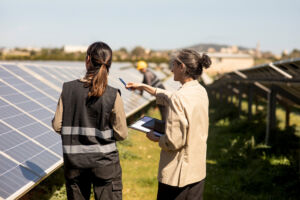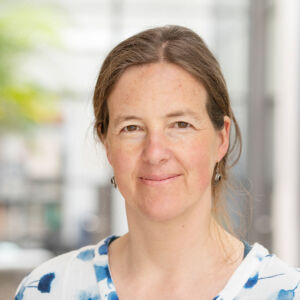
GreeN-H2 Namibia – Feasibility study on green hydrogen in Namibia
The GreeN-H2 Namibia project is investigating the feasibility of producing, converting and transporting green hydrogen in Namibia.
Can sustainability be achieved through technological developments alone? How can transformations towards sustainability be shaped in the face of escalating crises and conflicts?
While more and more people in civil society, as well as in business, administration, and politics, are committing to sustainability, conflicts and resistance are also growing. This is especially true when it involves changes to personal lifestyles, work environments, or businesses.
Crises such as the COVID-19 pandemic, wars in Ukraine and the Middle East, and the resulting economic upheavals and social tensions have fueled fears. Many people are not only concerned about the effects of climate change or biodiversity loss. They also perceive their economic and social situation as threatened. This includes rising living costs, a progressively multi-ethnic society, and interventions in their personal housing, working, and mobility habits.
To preserve the foundations of life in the long term, profound transformations of current societal lifestyles and economic systems are needed. These transformations must also address the relationships between society and nature. The goal is to enable all people to live a good life within planetary boundaries in the future. However, such transformations must also prioritize the fair design of this process and address existing inequalities.
“Transformations toward sustainability must be tested and reflected upon, enabling social learning. To achieve this, we need new spaces for learning and experience.”
Prof. Dr. Flurina Schneider, Scientific Director
Through our transdisciplinary research, we develop new ideas and approaches for shaping transformations toward sustainability. These approaches address the urgency and complex interconnections of social-ecological crises. They also consider the action opportunities of various societal actors and create the conditions for a fair distribution of benefits and burdens.
We analyze the causes and impacts of transformation conflicts in areas such as water, land, and biodiversity, as well as urban development, mobility, and consumption. We explore how conflicts can be addressed constructively. Additionally, we examine the barriers and enabling conditions for transformations, drawing lessons from past experiences. This includes social innovations such as post-fossil mobility cultures or the redesign of technical infrastructure systems.
Finally, we focus on the relationship between science and society. For science to produce knowledge with societal impact, it, too, must undergo change.
The GreeN-H2 Namibia project is investigating the feasibility of producing, converting and transporting green hydrogen in Namibia.
Stefanie Burkhart, Flurina Schneider
TRACTION Collective et al.
Dirk Arne Heyen et al.
Marion Mehring et al.
Sarah Nieß
Benjamin Nölting et al.
Michaela Rohrbach et al.
Sachverständigenkommission für den Vierten Gleichstellungsbericht der Bundesregierung
Lukas Sattlegger, Luca Nitschke, Immanuel Stieß
Farina L. Tolksdorf et al.
Johanna Cludius et al.
Tanja Kenkmann et al.
Heide Kerber, Senta Berner
Heide Kerber, Lukas Sattlegger
Heide Kerber, Lukas Sattlegger
Heide Kerber, Lukas Sattlegger
Michael Kreß-Ludwig et al.
Michael Kreß-Ludwig et al.
Philipp Lorber, Michaela Rohrbach
Oskar Marg et al.
Jonathan Pillen
Michaela Rohrbach
Lukas Sattlegger, Heide Kerber
Immanuel Stieß, Lukas Drees, Lukas Sattlegger
Karim Abu-Omar et al.
Corinna Fischer et al.
Christina Hoefling et al.
Oskar Marg et al.
Oskar Marg et al.
Engelbert Schramm, Caroline Douhaire, Tobias Hübner
Jutta Deffner, Immanuel Stieß
Leon Fuchs, Christina Hoefling, Lena Theiler
Jens Libbe, SynVer*Z - Synthese- und Vernetzungsprojekt Zukunftsstadt
Lukas Sattlegger
Jutta Deffner et al.
Björn Ebert et al.
Corinna Fischer et al.
Corinna Fischer, Immanuel Stieß
Christina Hoefling et al.
Jens Libbe et al.
Alexandra Lux, Lena Theiler
Oskar Marg et al.
Dieter Mortelmans et al.
Charlotte Schröner et al.
Nicola Schuldt-Baumgart et al.
Jutta Deffner, Melina Stein
Immanuel Stieß, Barbara Birzle-Harder, Melina Stein
Corinna Fischer et al.
Corinna Fischer et al.
Corinna Fischer, Immanuel Stieß
Oskar Marg, Michael Kreß-Ludwig, Alexandra Lux
Jan Hendrik Trapp et al.
Martin Zimmermann, Jan Hendrik Trapp, Jörg Felmeden
Jutta Deffner et al.
Konrad Götz, Barbara Birzle-Harder
Manuela Schönau et al.
Jutta Deffner
Alfred Rütten et al.
Konrad Götz et al.
Frieder Rubik, Tabea Hummel
Thomas Jahn et al.

